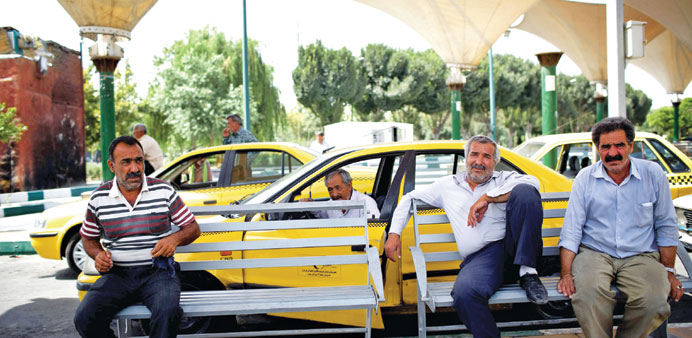AFP
Tehran
For Amir Moghtader the waiting has become a torment. Uncertainty is the cause, but as the clock ticks down he still hopes there can be a nuclear deal for Iran.
“I don’t know what the solution is, but the government should find it and it should benefit both sides,” he says, parked at Argentine Square, a busy intersection for workers entering and leaving central Tehran.
The 52-year-old taxi driver, like all Iranians, has become accustomed to waiting. But while diplomats bargain abroad over terms that could end a 13-year crisis over Iran’s nuclear programme, minds are filled with doubt and fear about the eventual outcome.
A pre-emptive announcement at talks in Vienna that a third deadline for a deal is likely to be missed today has only added to the uncertainty.
Moghtader is tired of the struggle. He may not be in oil or finance, the two biggest industries affected by Western sanctions on Iran, but the economic fallout has hit him all the same.
“If I have to buy a spare part for my car, I have to pay the equivalent price in dollars, but what I get from my customers is rials,” he says, alluding to inflation that has seen Iran’s currency shed two thirds of its value since 2011, when the nuclear crisis began to engulf the economy.
“We are all under pressure. I hope there can be a deal.”
Brinkmanship at a crunch point in negotiations is just politics to Ahmed Asgari, an oil and gas consultant, but the final outcome is pivotal.
“My fear is that if there is no deal my company will shut down,” he says. “We cannot endure this situation anymore. I have spent all my savings.”
From a staff that once consisted of 100 people, only 20 remain on the payroll at the Association of Petroleum Industry Engineering and Construction Companies (APEC), where Asgari is managing director.
He says sanctions have meant very few projects in the past eight years, with the most recent restrictions on banking in 2012 drying up finance and cash flow and hindering imports of vital equipment.
“Iran has huge gas reserves in the south but we can’t develop them and take advantage,” says Asgari.
“But if the embargo is removed, the experts we need will come back, we will receive funds and we will create jobs and perhaps persuade our youth that they do not need to emigrate.”
The economic divide in Iran—a decade-long boom from the early 1990s bolstered the middle class but is now a distant memory—has widened as sanctions have hit home.
Jahangir Raafat is one of the more fortunate, riding out hard times.
An oncologist, he can afford to educate his children abroad, and with a full waiting room of 30 patients, business has never dwindled.
“Everybody wants the sanctions removed, things would get better,” he says. “But we can manage if there is no deal. Of course, bright young people will still want to leave. We can’t stop them.”

Taxi drivers wait for passengers at Shoosh square in southern Tehran yesterday.
